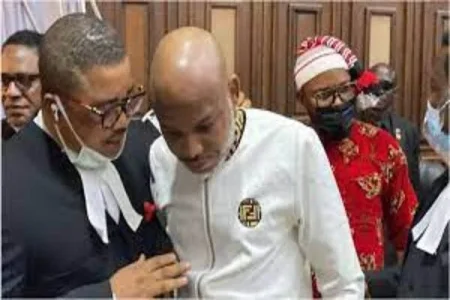
Nnamdi Kanu, leader of IPOB, challenges the legality of his trial, citing the Terrorism Prevention and Prohibition Act. He asserts that Nigerian law prohibits his prosecution in the country, labeling any attempt as an act of terrorism.
Nnamdi Kanu, the leader of the outlawed Indigenous Peoples of Biafra (IPOB), continues to challenge the legality of his trial, asserting it as unjust and illegal. Despite the Federal High Court's rejection of his plea to reinstate his bail and secure his release from the custody of the Department of State Services (DSS), Kanu remains resolute in his stance.
Speaking after a bail application hearing in Abuja, Kanu emphasized that no Nigerian court holds jurisdiction to prosecute him. He cited the Terrorism Prevention and Prohibition Act, which stipulates that he cannot be tried within Nigeria's borders, deeming any attempt to do so an act of terrorism. Kanu argued that violating international treaties, such as the one preventing his trial, is unlawful.
He refuted claims of bail violation, highlighting the invasion of his home as justification for his actions. Kanu's defiance underscores the deep-seated legal and political tensions surrounding his case and the broader issue of self-determination in Nigeria's southeastern region.




